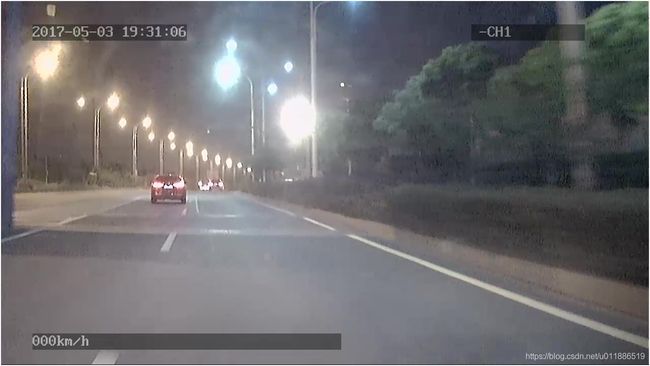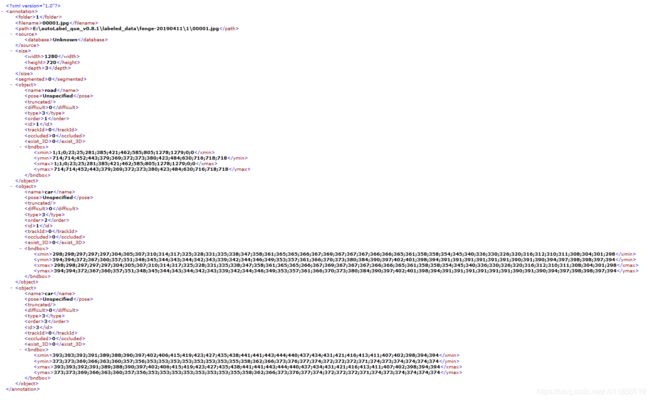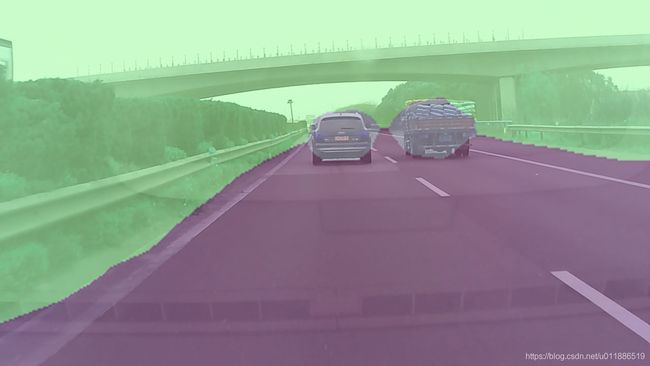tensorflow model deeplabv3 + mobilenetv2训练自标注数据流程整理
一、数据标注
图片(tmp.jpg),标注结果文件(tmp.xml)如下:
label 类别如下(10类):
road;(128, 64, 128, 80)
car;(0, 0, 142, 80)
bus;(0, 60, 100, 80)
truck;(0, 0, 70, 80)
bicycle;(255, 0, 0, 80)
motorcycle;(0, 0, 230, 80)
person;(220, 20, 60, 80)
traffic_sign;(220, 220, 0, 80)
obstacle;(153, 153, 153, 80)
background;(70, 130, 180, 80)
数据处理成cityscapes的格式,需要下载对应的cityscapes数据处理的脚本连接如下:
https://github.com/mcordts/cityscapesScripts
需要修改脚本文件夹中cityscapesscripts/helpers/labels.py中的labels列表为:
然后编写训练label图片生成代码fillobject.py如下:import numpy as np
import cv2 as cv
import os,sys
import xml.etree.ElementTree as ET
import os, sys, getopt
from collections import namedtuple
Point = namedtuple('Point', ['x', 'y'])
import matplotlib.pyplot as plt
# Image processing
# Check if PIL is actually Pillow as expected
try:
from PIL import PILLOW_VERSION
except:
print("Please install the module 'Pillow' for image processing, e.g.")
print("pip install pillow")
sys.exit(-1)
try:
import PIL.Image as Image
import PIL.ImageDraw as ImageDraw
except:
print("Failed to import the image processing packages.")
sys.exit(-1)
sys.path.append( os.path.normpath( os.path.join( os.path.dirname( __file__ ) , '..' , 'helpers' ) ) )
# from cityscapesscripts.helpers import Annotation
from cityscapesscripts.helpers.labels import name2label
from cityscapesscripts.helpers.labels import labels
def mkdir(path):
folder = os.path.exists(path)
if not folder:
os.makedirs(path)
print "--- new folder... ---"
print "--- OK ---"
else:
print "--- There is this folder! ---"
def xml2labelImg(xmlfile,encoding, outline=None):
# the size of the image
annotations = []
width ,height = fillobject(xmlfile, annotations)
size = (int(width), int(height))
if width ==0 :
return -1
# the background
if encoding == "ids":
background = name2label['unlabeled'].id
elif encoding == "trainIds":
background = name2label['unlabeled'].trainId
elif encoding == "color":
background = name2label['unlabeled'].color
else:
print("Unknown encoding '{}'".format(encoding))
return None
# this is the image that we want to create
if encoding == "color":
labelImg = Image.new("RGBA", size, background)
else:
labelImg = Image.new("L", size, background)
# a drawer to draw into the image
drawer = ImageDraw.Draw(labelImg)
# loop over all objects
for obj in annotations:
label = obj['name']
polygon = obj['coordinates']
if len(polygon)==1 :
continue
# If the label is not known, but ends with a 'group' (e.g. cargroup)
# try to remove the s and see if that works
if (not label in name2label) and label.endswith('group'):
label = label[:-len('group')]
if not label in name2label:
print ("Label '{}' not known.".format(label))
# If the ID is negative that polygon should not be drawn
if name2label[label].id < 0:
continue
if encoding == "ids":
val = name2label[label].id
elif encoding == "trainIds":
val = name2label[label].trainId
elif encoding == "color":
val = name2label[label].color
try:
if outline:
drawer.polygon(polygon, fill=val, outline=outline)
else:
drawer.polygon(polygon, fill=val)
except:
print("Failed to draw polygon with label {}".format(label))
raise
# labelImg.show()
return labelImg
def xml2instanceImg(xmlfile,encoding):
# the size of the image
annotations = []
width ,height = fillobject(xmlfile, annotations)
size = (int(width), int(height))
if width ==0 :
return -1
# the background
if encoding == "ids":
background = name2label['unlabeled'].id
elif encoding == "trainIds":
background = name2label['unlabeled'].trainId
else:
print("Unknown encoding '{}'".format(encoding))
return None
instanceImg = Image.new("I", size, background)
# a drawer to draw into the image
drawer = ImageDraw.Draw(instanceImg)
# loop over all objects
nbInstances = {}
for labelTuple in labels:
if labelTuple.hasInstances:
nbInstances[labelTuple.name] = 0
for obj in annotations:
label = obj['name']
polygon = obj['coordinates']
if len(polygon)==1 :
continue
# If the label is not known, but ends with a 'group' (e.g. cargroup)
# try to remove the s and see if that works
isGroup = False
if (not label in name2label) and label.endswith('group'):
label = label[:-len('group')]
isGroup = True
if not label in name2label:
print ("Label '{}' not known.".format(label))
# If the ID is negative that polygon should not be drawn
if name2label[label].id < 0:
continue
labelTuple = name2label[label]
if encoding == "ids":
id = labelTuple.id
elif encoding == "trainIds":
id = labelTuple.trainId
if labelTuple.hasInstances and not isGroup and id != 255:
id = id * 1000 + nbInstances[label]
nbInstances[label] += 1
# If the ID is negative that polygon should not be drawn
if id < 0:
continue
try:
drawer.polygon(polygon, fill=id)
except:
print("Failed to draw polygon with label {}".format(label))
raise
# labelImg.show()
return instanceImg
def fillobject(xml_file,res):
xmldoc = ET.parse(xml_file)
root = xmldoc.getroot()
size = root.find('size')
width = size.find('width').text
height = size.find('height').text
# bimg = np.zeros((int(height), int(width), 3), np.uint8)
if len(root.findall('object'))<1:
return 0,0
for object in root.iter('object'):
order = object.find('order')
name = object.find('name')
bndbox = object.find('bndbox')
box_xs = bndbox.find('xmin')
box_ys = bndbox.find('ymin')
box_xs = box_xs.text.strip().split(';')
box_ys = box_ys.text.strip().split(';')
contour = []
if len(box_xs) != len(box_ys):
return "box_xs != box_ys"
for i in range(len(box_xs)):
contour.append(Point(int(box_xs[i]), int(box_ys[i])))
res.append({'name':name.text,'order':order.text,'coordinates':contour})
res.sort(key=lambda k: (k.get('order', 0)))
return width,height
# xmlfile = "G:\\tensorflow\\datas\\deeplab\\tsari\\fenge\\fengetu_biaozhu_1000_decode\\2016-10-08-11-58-35_000400.xml"
# # cv.drawContours(bimg, contours, -1, (0,255,0), 3)
# colormask = xml2labelImg(xmlfile,'color')
path = "G:\\tensorflow\\datas\\deeplab\\tsari\\fenge_night\\labels\\"
xmlfiles= os.listdir(path)
outputpath = "G:\\tensorflow\\datas\\deeplab\\tsari\\fenge_night\\train\\"
mkdir(outputpath)
for xmlfile in xmlfiles:
print xmlfile
# colormask = xml2instanceImg(path + xmlfile,'ids')
colormask = xml2labelImg(path + xmlfile, 'trainIds')
if colormask ==-1:
continue
# colormaskname = xmlfile.strip().split('.xml')[0]+"_instanceIds.png"
colormaskname = xmlfile.strip().split('.xml')[0] + "_gtFine_labeltrainIds.png"
# print colormaskname
colormask.save(outputpath + colormaskname )
# bimg.show()
# cv.imshow('color',bimg)
# cv.waitKey()
运行脚本生成train所需的标注图片如下:
然后是整理数据存放位置如下:
+ datasets
+ cityscapes
+ leftImg8bit
+train
+fengetu1
1_train_leftImg8bit.png
*_leftImg8bit.png
......
+fengetu2
2_train_leftImg8bit.png
*_leftImg8bit.png
......
.....
+test
+fengetu1
1_test_leftImg8bit.png
*_test_leftImg8bit.png
......
+fengetu2
2_test_leftImg8bit.png
*_test_leftImg8bit.png
......
.....
+val
+fengetu1
1_test_leftImg8bit.png
*_test_leftImg8bit.png
......
+fengetu2
2_test_leftImg8bit.png
*_test_leftImg8bit.png
......
.....
+ gtFine
+train
+fengetu1
1_train_gtFine_labeltrainIds.png
*_gtFine_labeltrainIds.png
......
+fengetu2
2_train_gtFine_labeltrainIds.png
*_gtFine_labeltrainIds.png
......
.....
+test
+fengetu1
1_test_gtFine_labeltrainIds.png
*_test_gtFine_labeltrainIds.png
......
+fengetu2
2_test_gtFine_labeltrainIds.png
*_test_gtFine_labeltrainIds.png
......
.....
+val
+fengetu1
1_test_gtFine_labeltrainIds.png
*_test_gtFine_labeltrainIds.png
......
+fengetu2
2_test_gtFine_labeltrainIds.png
*_test_gtFine_labeltrainIds.png
......
..... 然后执行:
python datasets/build_cityscapes_data.py --cityscapes_root=datasets/cityscapes/ --output_dir=datasets/cityscapes/tfrecord/
注意:根据自己的类别修改该脚本中的参数_NUM_SHAEDS = 10(我的类别工十类,上面数据部分提到了):
_NUM_SHARDS = 10
# A map from data type to folder name that saves the data.
_FOLDERS_MAP = {
'image': 'leftImg8bit',
'label': 'gtFine',
}
# A map from data type to filename postfix.
_POSTFIX_MAP = {
'image': '_leftImg8bit',
'label': '_gtFine_labelTrainIds',
}
# A map from data type to data format.
_DATA_FORMAT_MAP = {
'image': 'png',
'label': 'png',
}生成结果如下:
![]()
二:训练
训练数据准备好后开始训练,执行脚本:
CUDA_VISIBLE_DEVICES=0,2,3,4,5, ~/anaconda3/bin/python deeplab/train.py --logtostderr --training_number_of_steps=50000 --train_split="train" --model_variant="mobilenet_v2" --train_crop_size=361 --train_crop_size=361 --train_batch_size=10 --dataset="cityscapes" --train_logdir=./deeplab/output/mobilenet_v2_tsari_361_10_weights --dataset_dir=datasets/cityscapes/tfrecord/ --tf_initial_checkpoint=deeplabv3_mnv2_cityscapes_train/model.ckpt --num_clones=5 --fine_tune_batch_norm=False --output_stride=16
当目标类别比例失衡时可以通过调整deeplab/utils/train_utils.py中的label weight进行类别均衡:
def add_softmax_cross_entropy_loss_for_each_scale()
......
ignore_weight = 0
label0_weight = 1
label1_weight = 10
label2_weight = 10
label3_weight = 50
label4_weight = 10
label5_weight = 10
label6_weight = 10
label7_weight = 50
label8_weight = 10
label9_weight = 1
not_ignore_mask = tf.to_float(tf.equal(scaled_labels,0))*label0_weight + \
tf.to_float(tf.equal(scaled_labels,1))*label1_weight + \
tf.to_float(tf.equal(scaled_labels,2))*label2_weight + \
tf.to_float(tf.equal(scaled_labels,3))*label3_weight + \
tf.to_float(tf.equal(scaled_labels,4))*label4_weight + \
tf.to_float(tf.equal(scaled_labels,5))*label5_weight + \
tf.to_float(tf.equal(scaled_labels,6))*label6_weight + \
tf.to_float(tf.equal(scaled_labels,7))*label7_weight + \
tf.to_float(tf.equal(scaled_labels,8))*label8_weight + \
tf.to_float(tf.equal(scaled_labels,9))*label9_weight +\
tf.to_float(tf.equal(scaled_labels,ignore_label))*ignore_weight
训练传入参数注意事项:
1、# When fine_tune_batch_norm=True, use at least batch size larger than 12
# (batch size more than 16 is better). Otherwise, one could use smaller batch
# size and set fine_tune_batch_norm=False.
2、# For `xception_65`, use atrous_rates = [12, 24, 36] if output_stride = 8, or
# rates = [6, 12, 18] if output_stride = 16. For `mobilenet_v2`, use None. Note
# one could use different atrous_rates/output_stride during training/evaluation
3、# When using 'mobilent_v2', we set atrous_rates = decoder_output_stride = None.
# When using 'xception_65' or 'resnet_v1' model variants, we set
# atrous_rates = [6, 12, 18] (output stride 16) and decoder_output_stride = 4.
# See core/feature_extractor.py for supported model variants.
4、训练mobilenetv2 需要设置 output_stride=16
三、模型转换
CUDA_VISIBLE_DEVICES=2 ~/anaconda3/bin/python deeplab/export_model.py --checkpoint_path=deeplab/output/mobilenet_v2_tsari_361_10_weights/model.ckpt-50000 --export_path=deeplab/output/mobilenet_v2_tsari_361_10_weights/frozen_inference_graph.pb --num_classes=10 --model_variant="mobilenet_v2"
四、模型测试
mobilenetv2+deeplabv3在gtx1080ti上,361*361大小的图片,网络处理的速度为29ms每帧
CUDA_VISIBLE_DEVICES=0 ~/anaconda3/bin/python deeplab_demo.py output/mobilenet_v2_tsari_361_10_weights/ /media/harddisk/cuicui_data/val_imgs/dayimgs/ result/day_1_6.17/1/ result/day_1_6.17/2/



